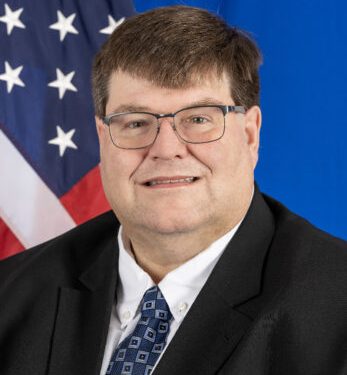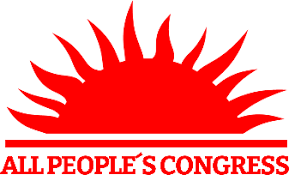By Cornelius Oguntola Melvin Deveaux
Several national issues require my opinion. Some deserve praise, while others need critical evaluation.
One issue that demands critical evaluation is the comments made by the US Ambassador to Sierra Leone, David Bryn Hunt, at a recent engagement with civil society organizations.
The New Age newspaper reports that the US Ambassador asserted at the engagement with civil society organizations that neither the Electoral Commission of Sierra Leone (ECSL) nor the political parties could produce the results of the June 24th, 2023 elections.
Another local newspaper reported the Ambassador’s determination to dictate the implementation of the recommendations of the Tripartite Committee.
In other media outlets, reports state that the US Ambassador made comments that lend credence to concerns that the Tripartite Committee was not inclusive and representative and lacked the hallmarks of democratic participation.
These reports have sparked various responses within the APC.
Some members see it as validating their concerns about the current government’s legitimacy and that the US, through its Ambassador, is wrongly dictating the pace of democracy in Sierra Leone, given that they knew the Tripartite Committee was not inclusive but provided funding for the exercise.
Others perceive it as hypocrisy, considering the Ambassador’s assurances to the APC that the US embassy possessed sufficient evidence for the June 24th, 2023 elections and would not require further evidence from the APC, coupled with the US government’s approval of the MCC compact grant.
Still, others view it as a cautionary tale, a lesson that would teach the APC to avoid relying on the international community for support to fight their political battles.
Few understand it as a show of the influence of the US in dictating the outcomes of elections and political decisions in Sierra Leone.
However, beyond these views, for a party whose national secretary general did not only claim on AYV television to have the full results of the June 24th, 2023 election but also promised to publish the full results and whose representatives at the Tripartite Committee claimed that after examining the APC result Samura Kamara had a commanding lead of 57.15%, the report in The New Age newspaper lends credence to accusations that the de-facto leadership of my party has not been honest in its doings.
It also represents another severe blow and disappointment to assumptions that the party is in capable hands.
The disappointment is palpable and highlights significant concerns about the party’s operational competence vis-a-vis its conduct as a credible opposition and government in waiting and its ability to win future elections.
The growing number of incidents, events, and statements highlighting the deep divisions within the de facto executive and exposing its ineptitude is no longer surprising.
They only reinforce the urgent need for a radical change in the APC’s leadership.
Furthermore, these trends highlight a more serious issue that demands the same vigor and determination the US Ambassador is demonstrating in pursuing the full implementation of the Tripartite Committee’s recommendations.
It has to do with accelerating the implementation of Resolution 4 and the remaining Resolutions of the Agreement for National Unity.
It is crucial to understand that the full implementation of the Tripartite Committee’s recommendations should be contingent upon the complete implementation of the Resolutions outlined in the Agreement for National Unity.
Resolution 4 of the Agreement for National Unity emphasizes peace and unity by prescribing that the government should drop all politically motivated cases against opposition members and those forced into exile be allowed to return.
At this point, we must not lose sight of the fact that forcing opposition politicians into exile and placing them under the yoke of politically motivated cases was a deliberate attempt by the ruling SLPP, acting in a conspiracy with ill-motivated APC members, to silence strong voices that could hold the government accountable.
Resolution 4 aims to ensure justice for affected party members, empowering their full and unhindered participation in the country’s political landscape, thus making it possible for the full participation of those who can change the course of the APC and national politics.
It will also enhance the opposition’s effectiveness and unity, fostering a more inclusive and harmonious political environment.
In my estimation, the current government and opposition APC leadership know that those capable of altering the trajectory within the APC and national politics are either in exile or muzzled by politically motivated cases.
In the opinion of some APC members in exile and under the yoke of politically motivated cases, the current government and some members of the opposition leadership are deliberately delaying the implementation of Resolution 4 of the Agreement for National Unity.
They prioritize their political agendas and the preservation of the status quo.
I feel obliged to bring to the attention of the US Ambassador and the public the need to accelerate the implementation of Resolution 4 and the other Resolutions in the Agreement for National Unity.
According to well-placed sources, the current government has formed a panel that does not represent the APC to review cases.
APC lawyers, led by Africanus Sesay and Sonia Osho Williams, have demanded the inclusion of the APC in the panel and the full implementation of Resolution 4 to ensure justice for all affected opposition politicians.
I must applaud the efforts of Yvonne Aki-Sawyer and the team, but their efforts would have been more impactful if supported by the party.
Unfortunately, reports indicate that both the government and some members of the APC leadership are uninterested in implementing Resolution 4 of the Agreement on National Unity.
They hold the view that if those who can change the course of the APC and national politics are allowed to return home and those under the yoke of politically motivated cases are relieved of this burden, it could threaten their political objective of maintaining control over the APC, further compromising the party’s chances of winning future elections and undermining the viability of the nation’s democracy.
I believe that the implementation of Resolution 4 and the other Resolutions in the Agreement for National Unity should receive the same commitment and determination demonstrated by the US Ambassador in pursuing the full implementation of the Tripartite Committee’s recommendations.
In conclusion, I am encouraged that there are positive developments in Sierra Leone.
A recent national achievement worth celebrating is the transition of Sierra Rutile, the world’s largest natural rutile producer, to local ownership, as reported by Swit Salone News (www.switsalone.com) on October 1st, 2024.
This significant shift means that Sierra Rutile is now owned by Leonoil, a company based in Freetown and owned by Sierra Leoneans.
It is a proud moment for Sierra Leone. It reflects the growing capacity of local enterprises and the determination to influence the global market.
Congratulations to these Sierra Leoneans. I hope they make us proud.
I also wish that Sierra Leoneans could take over the iron ore mines, the gold and diamond industry, and the importation of rice, onions, and other essential commodities.
Another notable national achievement deserving high praise is the signing of the MCC Compact between the US government and the Government of Sierra Leone. This landmark agreement, when implemented, will address the country’s long-standing electricity shortages, promising a brighter and more sustainable future for all Sierra Leoneans.
Finally, while I acknowledge the role played by the US Ambassador and other players in securing the grant, I wish to again remind the US Ambassador of his own words that “… the impact of any such investment depends on sustained democratic reforms, the full and expeditious implementation of the Agreement for National Unity and the joint recommendations of the Tripartite Committee will remain key requirements for compact implementation.”
It is why I believe my call to the US Ambassador to pay attention to the implementation of Resolution 4 of the Agreement for National Unity is appropriate.













